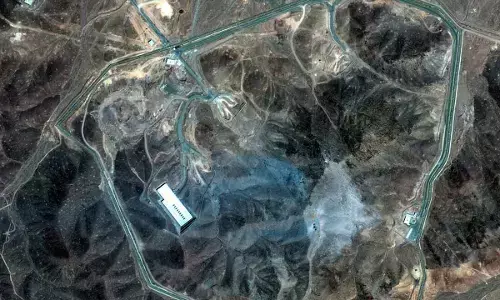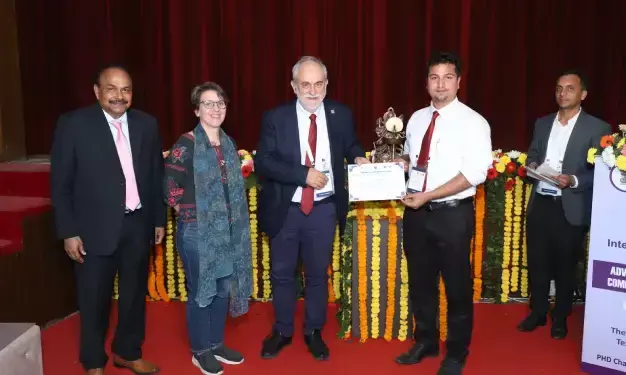Rethinking environmental education

Students who have education focused on conservation of natural resources and biodiversity, have a positive change in their attitude towards environment and sustainability. It not only enhances their knowledge but helps them to acquire skills to build strategies for betterment of environment and find solutions to the climate change effects
Environmental education has a key role in propelling the transition to a sustainable future. To bring about awareness and an effective change in attitudes traditional approach to environmental education may not be enough. Innovative ideas need to be incorporated to involve students and communities to acquire knowledge and more importantly skills to face the challenges to our environment and eco-systems due to pollution, rising global temperatures and other factors.
It is evident that students who have education focused on conservation of natural resources and biodiversity, have a positive change in their attitude towards environment and sustainability. It not only enhances their knowledge but helps them to acquire skills to build strategies for betterment of environment and find solutions to the climate change effects.
Education and climate change
Climate Change is one of the biggest threat faced by humanity currently. Education on problems due to climate change effects helps develop a pragmatic approach towards taking care of the environment and leading a sustainable lifestyle. Besides educated personnel in businesses and industry are essential to effectively tackle the climate change threat.
A research shows that if only 16 percent of high school students were educated on climate change and its consequences, it could result in huge reduction of carbon emissions by 2050.
Education on various environmental issues and their prospective solutions also influences students to be more responsible and thus helps reduce their lifetime carbon footprint. Beyond reducing carbon emissions, education can help save lives by preparing them to face the natural disasters like wildfires, landslides, hurricanes etc, caused by climate change effects.
Holistic approach
Humans have lost touch with nature. Deforestation, wildfires, pollution, global warming, biodiversity loss, land degradation, ocean pollution, greenhouse effect, etc are just consequences of our personal disconnection with nature.
This approach needs to change if we are going to make any headway in reversing environmental damage. Education is key to this change. But it cannot be traditional education where students are merely taught about environmental problems and told to recite facts. Instead, we need a holistic perspective that considers the interrelationship between humans and nature, deals with exploring possibilities and developing models of benevolent co-existence of all beings on Earth together with nature and eco-systems.
Opportunities
One of the main challenges with traditional environmental education is that it often focuses on imparting knowledge and raising awareness, rather than fostering skills and creating opportunities for action. While it is important for individuals to understand the science behind climate change and other environmental issues, this knowledge alone is not enough to drive change. Instead, we need to shift the focus on providing hands-on, experiential learning opportunities that allow individuals to develop the skills and confidence they need to take action.
Project-based learning
Environmental education needs to incorporate more project-based learning. This can include everything from designing and implementing community gardens to developing and implementing recycling programs. By giving individuals the opportunity to lead and contribute to real-world projects, they are able to develop important skills such as teamwork, critical thinking, and problem-solving. These skills are not only valuable for addressing environmental issues, but also for success in all areas of life.
Involving community
Students need to be motivated to work with local organisations and community members to identify and address specific environmental challenges in their community. By working together, individuals can learn about environmental issues and develop solutions that are tailored to their specific community context.
Education for all
Environmental education has traditionally been targeted at children and young people, but it is important to recognize that adults also need access to this information and opportunities to take action. By providing environmental education for all ages, we can ensure that individuals have the knowledge and skills they need throughout their lives to make sustainable choices and take action to protect the planet.
Marginalised communities
The environmental education needs to make students ecognizie and address the ways in which environmental issues disproportionately affect marginalised communities. It should ensure that environmental education programmes are inclusive and culturally responsive.
There is no one-size-fits-all approach to environmental education, but there are some key principles that should guide its development and implementation. It should be inclusive and accessible to everyone, should be based on sound scientific information, should be engaging and inspiring, make use of hands-on learning experiences and opportunities for reflection and involve communities to work together. It's time to rethink environmental education, not as an afterthought or an add-on, but as a central part of our efforts towards a sustainable future.
(The author is the founder of Smiling Tree)









